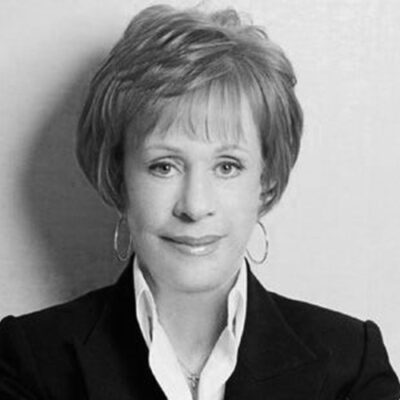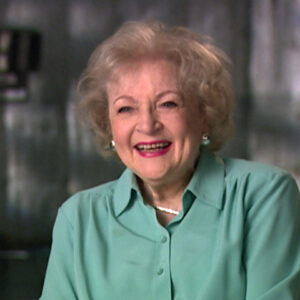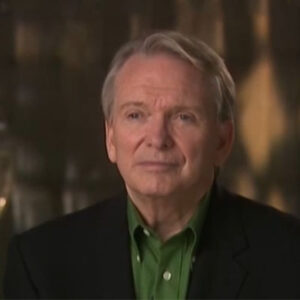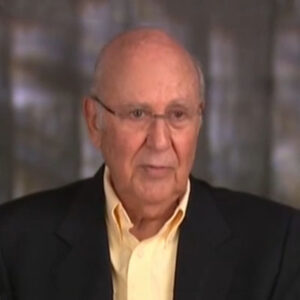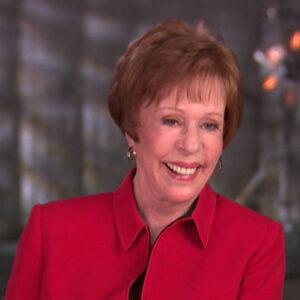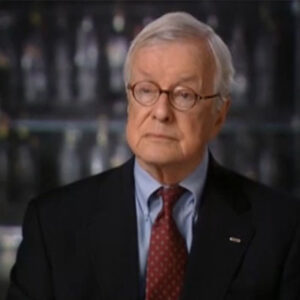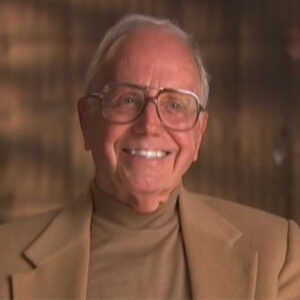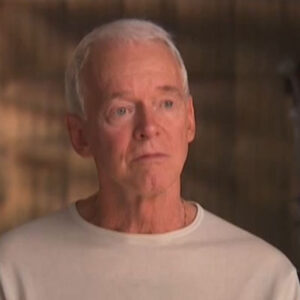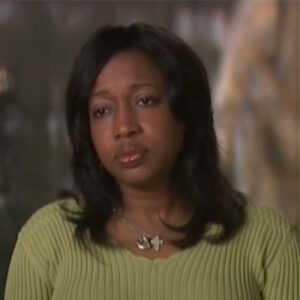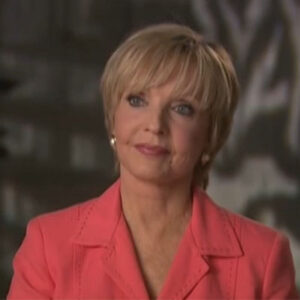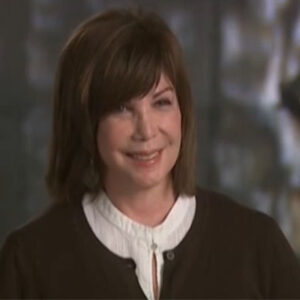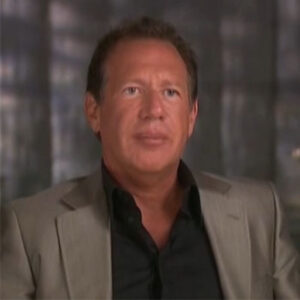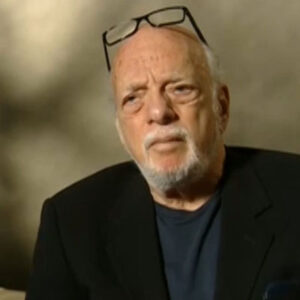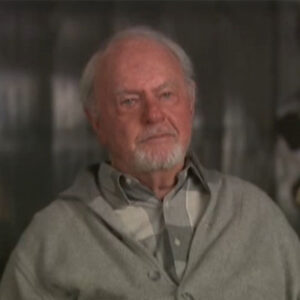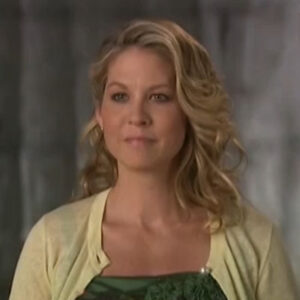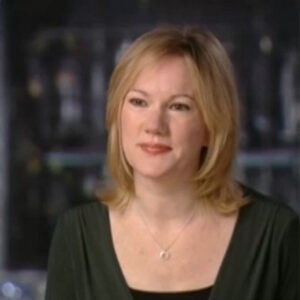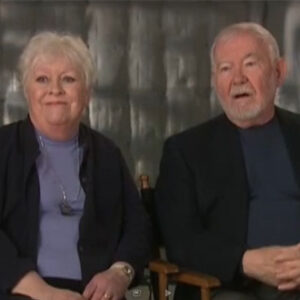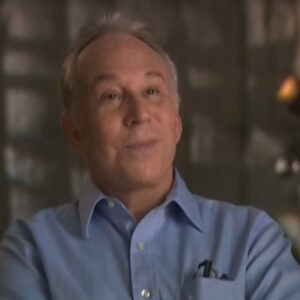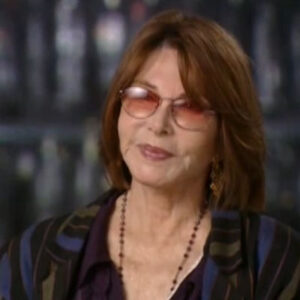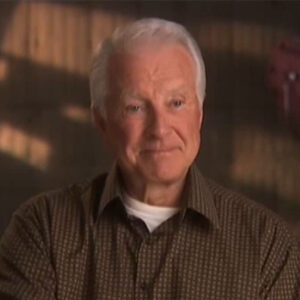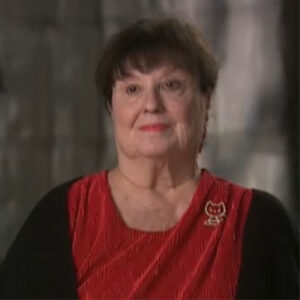Speaker When I first saw Carol, when she came to town with the circus.
Speaker She was, I think, seven at the time. She was working with small chimps and then I lost track of her.
Speaker And the next time I saw she’s on The Gary Moore Show and in New York on CBS Gary Moore Show, which was done partially live. And she was absolutely hysterical. It was unusual for a lady to do what Carol did in those days. I mean, all of the acrobatics and the physical stuff and everything wasn’t very ladylike. But Carol was I mean, she was such a charming lady and you just bought it. Whatever she did was wonderful. Well, stereotypes for women in terms of they were more or less dressed well and did very light humor in a sense, with the exception maybe of Lucy. But mostly they were almost they were mothers or they were and they guided the children or things like that. But Carol was jumping out of windows and not on the set, but in the in the building. And it just it was so unusual to find a lady that broad that it was extremely funny to just say women.
Speaker Oh, yeah. Okay. Yeah. Women in comedy at that time. They just kidding.
Speaker Okay.
Speaker Women in comedy at that time were not necessarily the broad comics. Maybe Martha Raye, Lucy. Things of that nature. Carroll was just. You thought she was supposed to be delicate because she was built that way and she was able to move as a real lady and yet play against that being so broad, going out windows and standing in front of trucks and wearing watermelons and things like that. I mean, it was just hysterical that a woman would allow herself to be that comedically abused, in a sense. And where that came from. But that sounded so important. I’m going to use it again, not in this interview, but I will get in front of people, you know what I mean? And she was hysterical.
Speaker How was she different than it was like the other.
Speaker I have always felt. I’ve never seen them together.
Speaker So I thought they were the same person. So I wasn’t quite sure that they were two different people at any time. Lucy was more of a studied abroad.
Speaker I don’t mean I mean humor. Carol just went for it. I mean, whatever happened, happened, if she was to fall out of window, she could fall out of that window ten, twelve different ways. Lucy would have it planned.
Speaker Here’s where I’m going to. I’m going with this. This will be the plan here for falling out a window. But, Carol, it’s just spontaneous.
Speaker So did you or did she like to be sort of more rehearsed?
Speaker Carol, improvise quite a bit. I wrote most of those in provisions for her. And then we put them on huge cards and she’d study them and then she’d go improvise. So I feel responsible for that part of her career.
Speaker What did you think when you heard she was getting her own show? Here was a woman hosting a variety show. How unusual is that?
Speaker We didn’t get the news right away. The Carol is going to be on television with her own show because we didn’t have a television set. However, the newsboy had one and he said that he had seen it on television, that she was going to have a show. And we were thrilled, just thrilled. The first time I worked with Carol was on The Garry Moore Show. I went to be a guest on The Garry Moore Show in New York. And you had to sing a song in it. I cannot sing. People don’t play that. I cannot sing. And a guy was playing the piano, said, no. Let me let me just play some songs. Don’t have everybody on this. He played 44 songs that every child knows. I couldn’t sing one of them. I knew the words. I just. Row, row, row your boat. I couldn’t even get there. You said you’re right. You can’t sing. So I became kind of the.
Speaker The goof on the show and I did that show and I was so nervous that I did throw up Underwood’s shoes.
Speaker He was so pleased with that, as I recall. And I met Carol. She was the most delightful person you could meet. I mean, here’s this guy coming from Cleveland who didn’t know diddly squat about anything. And she was kind to me, just said, you know, do whatever you do. I mean, she never discussed whether business. I mean, she’s just a nice person to me. And it was such a great start in the business.
Speaker Do you remember the first?
Speaker Yes, I did. The first sketch I did on Carol’s show was I was a Superman and I couldn’t get my clothes off. So I was in this booth alone time trying to get my clothes off and then the booth locked and I just was left in there and I thought it was hysterical.
Speaker The audience stared and and then later, Carol got her show at CBS. She actually asked me back to do another show. Joe Hillingdon, her husband did. And Carol and I couldn’t understand that because it really wasn’t that good. The first time around. And but it did. And then I did the first when Carol first came. I did the first year. I did, I think two or three shows in the second year I did five and then I did like seven. Then they asked me to be a regular, which was 33 shows a year. And I said no, because that would take all my time just doing your show. So I said, I will do 32 of the 33 shows, which I did. And then the thirty third show I guested on it. So I was almost regular on the show. Yes, he’ll do it for big money.
Speaker There was a time when the variety show. How big was that at the time and how was it.
Speaker I believe started out rather slowly because people were in question about and plus the fact there were 15 variety shows on at the time. So, I mean, you were just watching variety after variety of variety, different kinds of variety shows. But once it caught on, it just never got out of the first the top ten. As a matter of fact, once you went off the air, she was still in the top 10. So it and it’s all to that show was Carol’s was responsible for that show.
Speaker She’s the most generous star you could ever meet. Most stars who see something funny happen say I’ll be doing that. So just those lines will be my Carol just said go with it. She treated the show is over alive. Then we delays we had in waiting for anything was for the set changes and costume changes. But we would do an hour and a half in about an hour. I mean on our show in about an hour and 20 minutes, as fast as I could change the sets and we could change fast as we did it. So it was pretty much alive. Variety show on on a weekly basis. She kept it that way.
Speaker And then if there were mistakes and there were plenty because, well, you know, Harvey, being a very poor performer was cracking up all the time and we couldn’t understand why. And we talked to him several times about it and he continued to do it. I was a writer on the show, so I would write a sketch for us. And then I wouldn’t do the lines that I wrote for myself. I would do other lines. And that would confuse Harvey. And then he would just go south on us. And we sometimes have to stop, actually. Very annoying.
Speaker My favorite. So when the show started. Fifteen shows and what happened over the course of a while.
Speaker There were things on the air when Carol first started. Oh, gee. That were Glen Campbell and the Smothers Brothers and the Hollywood Palace.
Speaker I mean, it was just you could work for years just doing variety shows, which I did. And I had the opportunity to work with everybody in the business that I ever saw onscreen or ever wish to even meet. I had an opportunity to work with. And Carol, you know, was the queen of all of this material, knew everybody. So she invited everybody on her show. I got to meet most wonderful people in the business because of her. And she just people gravitated to her because she was so good.
Speaker I mean, there was no fear that when you came to that show that you were going to be mistreated. Some people had a little bit of difficulty in sketches, but it was always on cards for them.
Speaker Carol was very gentle with them. Just, you know, it doesn’t matter. Just do do what you think you can with it. You know, you don’t have to read every line, you know. I didn’t know there were cards until the seventh year. I looked over in those lines for the show.
Speaker Yes. And what about by the time the show went on? What was happening with the variety show or the variety show?
Speaker By the time we went off. We were still number one variety show, but variety was beginning to wane a little bit.
Speaker And the networks were getting. We were doing more classical stuff at the time and getting some major stars on television.
Speaker So variety kind of it was like what Bill was just kind of fading and going out. So at dinner one night, Carol said, go to dinner. And it was Harvey, myself and our wives, Carol and Joe.
Speaker And we had dinner and Carol said, I have something to tell you. I have decided that this will be our last year. And I’ve done of the 15, 20 sketches, and I just don’t I don’t think it’s filled from audience or to the public. And so we’re not going to show any more. And she got up and left and went to the restroom and I sat there and I looked at Joe and I said, Okay, Joe, here’s the plan.
Speaker We tell CBS she went nuts. We put her in an asylum. Don’t tell her. Where she is and we continue to do the show, Harvey and I will get another lady, which can’t be that hard to find. And he didn’t go for it. Incidentally, Harvey and I are still doing the show. We go down every Friday and I do a show. They don’t tape. So they’re way behind on that. I’m still at CBS. Yes. Yes.
Speaker And what was Carol’s role on the show? Like you were talking about you were a writer. How did did she. Did you pitch ideas to her? How did what was her sort of function in terms of.
Speaker Carol had a lot of ideas for the show.
Speaker I don’t think that she basically had the time to write them. But I mean, her ideas were so solid. The minute she said them, I had to do just get to a typewriter and type as fast as you can. There were only five or six writers, I think, on the show at the time. But a lot of things came from just tossing ideas around. And Joe would assign and say, OK, that’s good, I did. You guys write that? And the writers knew the performer’s so well that it was very easy for them to put all that on paper. A lot of the sketches came from what we actually did or said in rehearsals. I know they wigan’s and TUD thing came from. We had an office, the writers, it was way in the back and then down the hall was Charlena Secretary. And so if you were typing and in those days you typed and you made a mistake or something, you’d have to take the thing down to Shirley and she’d wait it out and I mean you’d bring it back. We get tired of walking. Most of our time was done walking. And so we said they put in an intercom and it was one of those with just two buttons talk and listen. And so they put it in. And so now we go. You press the talk button and say, Charlene, I have some mature.
Speaker And she go, Hello? And you go, Charlie, I have some things here. Hello, Charlene. Don’t don’t. Pressure button. Hello. Don’t press the button while I’m talking. Because. Hello. So you pick up your stuff. Down to it. Towards sex. I just did for me.
Speaker And out of that came out Wiggins and Tidball and Bob Mackie design Carol’s dress, which had a rather large derriere.
Speaker And she loved the character.
Speaker And it was it was just it was a stupid. These two people, how they ever got together and worked in the same office and just got. We must’ve done 30 of those things.
Speaker You see, Carol. Was there some way that she had to work her way into.
Speaker Carol found her characters very easily because, first of all, Carol’s very funny. So you start. You know, it’s like saying to Harry Truman, you’ve got a sketch for, you know, here’s. And they go, I don’t know.
Speaker You know, I mean, she just she’s already funny. She’s sitting there, so she’s funny. So I said, OK, well, here’s the thing. I’m going to do a takeoff on Gone with the Wind. Oh, great. Good. OK. And Harvey, you’ll be Clark Gable.
Speaker Linda and Bob has an idea for a dress. He’s going to take this curtain and still have the curtain rod in it, and this will be them training you. Somebody made this dress for you and Harvey. I’ll say all that. I love that dress. And you could say what? Yeah, there was something I saw in the window and I just couldn’t pass it by. And that, you know, that was the basis practically of a whole thing. But the other characters were so good, Vicky Harvey along the way that it just melded the whole sketch. And that’s how great things came out of that show.
Speaker Did you ever struggle with finding this character? Is that right for me?
Speaker I I don’t think terrible ever was side lined by trying to think of a character, she always would come up with something lovely and sketches that didn’t work. I mean, you know, all those years we were doing a sketch one time. And Joe Hamilton came on stage and said, stop doing this. And he did this gangster sketch. It was going nowhere. And unfortunately, I had just been hit by banana cream pie as a joke, made me come on a couple lines earlier and I wouldn’t smell like a banana all night. But, yeah, there were very slight misses along the way. Even the ones that didn’t work weren’t because of the people in them.
Speaker You know, Carol and Joe working together, they have very distinct roles. He does it work.
Speaker Carol was the talent. Joe was the producer. Carol may say once, well, Joe, I don’t know whether we should do something about. He would fix it or Joe would come and say, you know what you’re doing. Maybe he’s not going to. Could you fix it? So other than that, they were a great team. I mean, you had to be. I mean, this is once you get upset with somebody along the way. I mean, that carries over into your performance. And you can’t can afford to do that. And they would do things like one time I was playing the Lone Ranger, I had a mask on and I was talking to Tonto on a telephone. And the sketch was not that good. And as a matter of fact, Bob Newhart was supposed to have done it the week before. And he said, you know, I don’t think I’m going to do this. So I got it the next week. And I’m on this phone as a Lone Ranger and I’m talking to Tonto, but they hook the phone up to Joe in in the booth. So he was actually talking to me on the phone and he’s going, you know, Nouhad wouldn’t do this stuff. And he said it really stunk. Listen, Tonto, I’ve got to go. And you have to continue with your sketch while Joe’s going. It’s not getting any better. Bob was really right. So, as you know, things like that gave it a little inside humor.
Speaker Did they keep their word? They were married.
Speaker Was their personal lives just very separate where he was?
Speaker I think so, yeah. You know, I don’t I don’t think they were ever away from work because, I mean, that was it. You know, I’ll I’ll I’ll see it right there. OK. And then they’re side by side.
Speaker So I’ll see you tonight. OK.
Speaker So I don’t think the river separate by that much. I don’t ever recall really arguments, you know. I mean, you get annoyed once in a while, but I don’t think there’s anything that was ever made a difference in the show.
Speaker What were some of her favorite characters of hers or or any favorite sketches?
Speaker I liked Carol’s Wigan’s because it kind of I wrote a lot of them, but we also had an opportunity just to work with each other. Not that excluding the rest of the cast was a wonderful thrill, that wasn’t it. But we I was really one on one. Carol was very, very difficult to break up. I mean, she just would take those lines and audiences would keep laughing, knowing that she’s trying to prevent herself from laughing. And that just used to tickle me silly.
Speaker And so I would think of things that, you know, one day she was walking by the front of the desk and here is this derriere, walking by with the black skirt on and everything. And it’s like this. And she’s walking by.
Speaker And as she walked by, I said, Could you just stop a minute there? Do you know from the waist down you look at like a silhouette of Africa. And that was the only time I really saw. But this. And that was just an ad lib. I mean, as she went by, it did look like Africa on the map or just so.
Speaker Did you. Did we miss any of that? It’s good.
Speaker Yes, I should have said.
Speaker What were those calls?
Speaker I was I talked to Don Criden this week and he said that there was a word for those when you sort of held up.
Speaker Saver. Yeah. These two have cue cards for the whole show. So everybody’s like Carol never used them. Harvey never used them. I didn’t know they were there in the seventh year. But I’m dyslexic, so I couldn’t read a many when I’m gone. It looks like it’s I guess, it to be part of the show. But sometimes guests would come on and, you know, weren’t used to that kind of memorizing and everything. And. But we had sometimes sketches where in the middle of the show, I would take Harvey’s part. He would take my parts and we would just reverse parts. So, I mean, you had to. But we were used to it. I mean, you were you just you know, I forgot what the question was. What was the question?
Speaker What are savours?
Speaker Oh, savouries. Well, they would have all the lines of everybody’s, you know, the cast line down there just in case you had forgotten where you were or I had said something that was not in the sketch and they would kind of look to the cards and go, I wonder what he’s talking about.
Speaker And instead of my lines, they would just put in their sabers over savor because I would say they would say, are you going to say all these lines? I don’t think so. This would be kind of a saver here at the service I received my card just said savours on it. It’s about 50 service service over service service.
Speaker And, Carol, the hardest one.
Speaker Oh, yes. Carol was very difficult to break up. She’s very professional. It’s very annoying.
Speaker There was one, but if you could tell. It was a family sketch where.
Speaker If I became a great integral part of the Dick Clark bloopers, because they kept taking a lot from our show, we were doing one show. Joe came out with.
Speaker We were playing a game. And Carol was to give me a hint. And my key word was elephant. And Joe said, we’re very long on a sketch. Just say elephant and let’s move on. All right. OK. So in dress, Carol, said Khlo. And I said and I told a story about two elephants that I had known who were joined. Siamese elephants joined at the trunk and they were in circus to save a little monkey, come out and do a meringue gay on their trunks. And they couldn’t go like other animals because their trunks.
Speaker And so they could just go north. And then one day when elephants sneezed and blew the owner’s brains out. And I continue the story a little and it went about two minutes. And I looked back in the booth. And those people were laughing. They’re going.
Speaker So Joe said for the air show, just say elephant. All right. Just because we’re very long.
Speaker The other thing, very amusing, but just elephant. So then I did a three minute dissertation on the trainer who seemingly had something more going with the elephant than we ever suspected and was buried with the elephant at a time. And they left it in. And everybody just sat there. That was the one time that Carol just she knew that Joe was sitting back there going, why doesn’t he shut up and just go with the show is going to be long. What are we going to do? And they’re all just like this. And Vicky was just sitting there very. Vicky was a good one, too. Boy, I mean, she used to come up with some great ones.
Speaker Was just sitting there as she waited for and after the audience and Carol phone on the floor and everything, and the audience had stopped thinking, looked over and said, does that look?
Speaker And that’s when I went on the floor.
Speaker What can you talk, talk about the Younus character a little bit, because that was kind of. I mean, it was. She was hysterically funny. That was pretty intense. You need to know if that was a departure for.
Speaker The family sketches with Vicky and Carol, two great characters that they came up with. I mean, Vicky went on to do her own show with Mama and now is even doing the nightclub act as Mama Harvey as Ed. I did a few of them as the guy who worked in the hardware with it and was hard of hearing, but assumed that everybody else was and would yell at everybody else.
Speaker And so at a lower. But those two characters were so true to life. And if you’ll notice, if you ever watch one, there are no jokes. There are no jokes in the sketches. It’s all just you say. I say.
Speaker And it’s so true to life, the arguments that they had over that silly game of, you know, that they would play at the table and just the dumb arguments that would come from that were so true to life. I mean, that’s what families did. In real life, it’s the classic sketches.
Speaker Was it were they it was Eunice based. Did Carole draw on any of her family? I think.
Speaker I think we we all do that. Yeah, I think we all do. I know I I live to watch Everybody Loves Raymond now because I know all those people.
Speaker I’m married to an Italian. I know that family. I know the mother and dad and the whole the whole thing. And I think that’s what Carol did. Carol, looking at her youth, knew those characters.
Speaker Her mother was in there. Her you know, her sister, her everything was in there. So, yes, they did draw on real life.
Speaker And do you think it was part of also was it hurt? Did you see her work evolved over the years of the show? I mean, did it go from, as you like, comedy was changing at the same time?
Speaker It was more sort of strictly slapstick and more character driven. Is that true?
Speaker Yeah, I think we kind of got a little caught up in maybe what was happening with real television. We started out doing pretty broad sketches and then we kind of did sketches where there was a beginning, middle and end and they were a little more like situation comedy sketches, writers. You know, we came to the best time in television because television was exploring television.
Speaker They were exploring what a family situation comedy was. Dick Van Dyke and Lucy and all of that. Now, writers looked at shows that are on the air that are that they assume are. Family sketches, friends and things like that. You see friends and then you go over here and you see friends again because that’s what they think the situation comedy is. But in the early start of comedy, they were drawing from everything, from jobs, from households and things like that.
Speaker So Carol’s some of the sketches did have a tendency to vary and get a little straighter or a little more of a message to them.
Speaker But they always they always ended up.
Speaker On the floor, it was it was comedy changing at that time was becoming more intellectual.
Speaker Yes, I think comedy at that time the Smothers Brothers were taking a stand and we’re not going to start burning. Okay. You’re fired. I’m nuts. So when we never got into anything political, nothing about race, Carol didn’t believe in dividing an audience. I say I’m a Republican. Thrown out of town. So. She never declared anything. And there was a reason for that. She did in her personal life. And she and she would help so many causes, you couldn’t even count them. But Carol never felt that we as entertainers, and especially me.
Speaker I consider myself the dumbest guy in the business. I know nothing. And I’m so happy because when they’re arguing, I don’t know what they’re arguing about, but we are not qualified to get in front of a microphone and say, listen, I think we should vote this way.
Speaker I think we should do that. I think this religion I think that scientists, you know, it’s only because we have the right to talk into this and people will listen and we don’t. If you don’t have the authority and you don’t have all the information, why should you talk these people into doing something? And she always believed in that. And that certainly was entrusted to me.
Speaker I don’t you know, I don’t touch anything because I don’t know anything. I’m just I’m just stupid.
Speaker Do you think so? Because I know she did like one of the things that I noticed was that the women’s movement going on during that time. Did you see that at all reflected in some of the characters or sketches?
Speaker Oh, I think eventually. But I think that was out of respect. I don’t think she, you know, cleaned up anything or changed anything just because the woman’s movement or things like that.
Speaker She just had respect for women. And when it came out that we now have respect for. Oh, good. Well, I’ve always had that.
Speaker So let’s just try it and not try it in a sketch. And we never did sketches on, you know, that I’m hitting it on the head.
Speaker But mean she directed things that she normally wouldn’t have done, you know, in a different direction. I think we all did. You know, I mean, first of all, we were governed by the networks. You couldn’t swear. You couldn’t. There was no nudity or violence only in my house. And so, you know, we never were, you know, subject to that. So but we did things that nowadays you could not do. We did. You know, I was interrogating Lyle one time as a German officer. You can’t do that. No. You know, you can’t make up six verses a go. Listen, I don’t know if he hadn’t even of laughing could do a lot of things. It’s okay to get on television and list 44 swearwords and do a lot of nudity and sex and everything. But you shouldn’t do you shouldn’t make fun. I don’t think of languages because that can really influence the children.
Speaker I belong to the parent teachers, parent teachers. I belong to the Parents Council on television, which we’re not trying to burn scripts. And none of us were on Carol’s show. What we were trying to do isn’t say, if you’re going to do those kind of things, put it at 10 o’clock when the kids are bit. You know, we’re I’m going to watch it. You know, in my real life, I probably should be in Leavenworth, but I’m not going to certainly present it to children to say, jeez, can we all do that? No, you can’t. I can.
Speaker Do you think that you got away with more?
Speaker Because like this mother, you know, we inadvertently did and didn’t know we were.
Speaker Can you say we got a lot of we got away with a lot on the show that we didn’t know we were getting away with? You know, Carol, sitting in a bathtub with me, singing a song and then drops the soap and I go and then I pick up the soap and give it to her again and she drops it again. I mean, probably today that would be wait a minute. You know, but it was done in humor and it happened as an accident. I mean, Carol just dropped soap. So it wasn’t like, watch this.
Speaker This is really my trying to get a cannonball into a cannon and the cannon ball goes in my pants and I’m now with a cannon ball in my pants. And I put the cannonball that’s in my pants in the cannon. And then I fall down and the cannonball rolls out of the cannon and hits the other cannonball. It’s in my pants.
Speaker You probably today wouldn’t there would be some question about that. It was just a solid combo. We didn’t mean we weren’t saying, you know this and we’re trying to sneak something in here.
Speaker Back to the women’s issue for a second. I didn’t think I had read that. For example, there was a sketch that was written that Karels was to play Gloria Steinem and then, you know, sort of portrayed her in the and the mouse runs through and she gets freaked out and jumps on her chair and said, no, I’m not. Do you remember?
Speaker I don’t. I don’t remember. Gloria Steinem sketch were a mouse run through an Kerala’s during Gloria and she then jumped on a chair or something. I don’t think she didn’t do it because she didn’t want to hurt women’s rights or anything. I think that she didn’t think it was funny. So as she just said, I’m sorry, what, to come up with something humorous? Maybe she would have done it. And I think also she probably was, you know, that that was Carol. She would protect certain rights of certain people. Certain people. You know, we never. If somebody destroyed their life on a personal basis in the country.
Speaker I mean, Carol never went and said, OK, let’s get this guy, you know? I mean, nowadays you make a mistake and you’re on The Tonight Show for a week if you’re lucky and they rip you apart and then you’re destroyed in the papers and radio gets you. And, you know, I mean. But Carol didn’t believe in that. First of all.
Speaker She can’t do that because she’s she’s not that type of personality. She’s too nice.
Speaker What about the Q&A stuff that she always did? Can you talk about why that was so such an important element of the show when it showed?
Speaker The Q&A portion of the show was used to adjust the time of the show. If we were long and we cut down a lot on the Q&A with the show came up short, they put more Q&A in. But all of those were absolutely strictly off the cuff.
Speaker Carol would say, what do you do? Come on up. That was all Carol’s doing. There were never there was never anything written that you come up and we’ll do this. And this will be funny. No, never. It was all Carol’s. She was a genius in first of all, she loved to communicate with people. She loved people. She loved talking to them. So it wasn’t any big shake for her to come up and say, you know, are you doing what you say? Where are you from? Lady came up when times said, Where’s the ladies room?
Speaker Right here. Here. And she took her back there. No, no, no. You go right. You’re going right in there. OK, you let me know now if you need anything in there and went back to the shop.
Speaker You know, those are you know, those are jewels that you couldn’t first of all, you couldn’t stage wouldn’t work because there would be some kind of. I didn’t get that cameras out. OK, do it again.
Speaker So do you think they were a key part of her success or her ability or did it show?
Speaker Yes. I’ve never seen Carol say no autographs. I’ve never heard say somebody says hello. That she didn’t say hello. Where are you from? I do not affect people. Get annoyed with her. You know, they go, hi, how are you? It’s fine. How are you? I’m pretty good. Where do you live? Well, we were if we were going home, we have groceries. Can I help you with anything? No. Let’s funds. Leave us alone. And we enjoy people. I, she, I enjoy you know, a lady came up to me the other day.
Speaker Could I have your autograph. And I said, yeah. So I, I go there you go. And she goes, I can’t read this. I said, well that’s kind of the charm of an autograph. What’s really your signature? And she said, well, nobody’s going to believe this. And I said, I’ll tell you what. Let me take this home and I’ll type it. And you give me your address and I’ll mail it back. So I took it. I typed my name when I got home and I mailed it back. So she’s going on. Going.
Speaker That’s.
Speaker So really, I get great e-mails me.
Speaker I just wanted to fall on the just the likability thing is that is something that you can’t fake. I mean, is the fact that she actually is a nice person? Is that a key part of, you know, the audiences can read it. Read that. I imagine.
Speaker Carol would never do well in politics for the simple reason that she is likable. A lot of politicians go. Hi, how are you? Good to see you. And Charlie. That’s good, Bello. Hi, how are you? If you brought them back and said, what’s my name and what’s my child’s name? And if you don’t tell me, I’m going to shoot you. We would lose a lot of politics. Carol gets involved. You don’t say hello to Carol without spending a few moments, you know? And she just she gets into your life and she’s so happy that she’s met you and you might get a note or she might come over and stay for a week. It just I mean, she just loves people. She loves the fact that people watched her and put her where she is today. I mean, she’s very appreciative. And that rubbed off on all of us.
Speaker I really do think that TV in particular picks up on that. I mean, if you’re sort of faking it.
Speaker TV is very honest. It really is. I mean, you you look at shows now that are kind of new shows where you see these young kids nowadays, these actresses and actors are so good that they all look alike, which I think is a great idea to have all blondes and good looking guys.
Speaker And you can’t tell them apart. There’s no communication. I mean, we read a lot about how wonderful they are. But you’d never see anybody really talking to anybody. No. And Carol’s just she instilled that along with a lot of other good qualities in performers that worked with her.
Speaker What about her cha woman character? I just wonder what you mean. It’s interesting that that’s sort of the iconic image of her, and it wasn’t usually the funniest. But there’s no really like what is it about women?
Speaker It’s yeah. The first charwoman sketches started out where she was just the cleaning lady and she would sing down boy. This is a great place. I also sing a song. OK, get on. Then it became kind of involved and she got into really being a CHA woman and getting a job, you know.
Speaker But it was a way of Carol saying that you don’t you can be a CHA woman and you can be on stage in the office while everybody’s gone home and perform. You can be whatever you want to be, whatever you’re doing, it doesn’t matter. You know, my dad was a whip. My dad came from Ireland. And over there, when you’re having Fox, a whip is a guy who’s on a horse who keeps all the hounds in line because they’re the dumbest animals in the world. So, yeah, that’s good. And you’re going to chase us, FOX. He came to this country thinking that would be a big calling for wimps, you know, to back out and certainly not too many whips. But it’s like the chairwoman, she believes it. No matter what you’re doing, it’s important. And my dad’s still out there in the backyard whipping borton, but he’s happy.
Speaker Is that, like, really, Carol, with that character?
Speaker I think so. Carol has often said how lucky she is that everything fell into place. And there’s a reason everything fell into place because she’s so darn talented.
Speaker It couldn’t have happened any other way.
Speaker But she doesn’t go for the talent she goes for. Joe was lucky I got that. I got. And I moved. And I went. I kept. Well, boy, I am. And she’s so happy that the people who were watching her and encouraged her along the way that she, you know, she just blesses everybody with the fact that they were so kind to her.
Speaker Did she feel about her own talents? She said many times, especially early on, she was always more comfortable playing a character.
Speaker Oh, I think we all are. Yeah. You got a chance to hide. Yeah. I mean, whether it’s just a different way of speaking or whatever the same mean talking. I’ll tell you something about those guys here. So you get a chance to hide your feelings, hide. You know, you don’t have to be real. I think my being real just tears me apart. I yeah. And Carol’s kind of the same way, but she’s more real than I certainly ever will.
Speaker I don’t think, to be honest, Carolyn, I have ever had a serious discussion.
Speaker We have never had. I mean, she doesn’t say, what do you think? And I well, basically, I believe that, you know, so we never do that.
Speaker Never. Even when the show went off, I couldn’t say goodbye in a real legitimate way. And because I first of all, it was.
Speaker Here later, but. No. It just is a friend.
Speaker And I and she taught me to be a friend. She taught me to be friends with people. She has been a big part of my life for helping me to enjoy life and other people and. So why would I have a serious conversation with her? So I just thank her for it.
Speaker Can you describe the last.
Speaker The last episode was kind of you would you’d want to say it was sad, but it wasn’t. It was it was kind of hard to do because you were kind of keyed up for the following week. You know, that’s the way that show went. Friday nights was half voice. This one’s Alloway. What do we got next week? So this one was gonna be Allaway and it was gonna be nothing next week. That’s that’s just going to be weird that we’re not all gonna get together. We’re not gonna come in. We couldn’t wait for Monday to come to tell the tales of the weekend that you. But this was going to be different. And so it seemed.
Speaker A little downcast and understandably, I mean, Carol is going to say goodbye and good night for the last time. After 11 years. And so that part of it was unusual. But for the most part, it wasn’t sad because we’d spent a lot of time together and it had been good, good times.
Speaker Carol herself.
Speaker I think she had quite a burden for the last show because it was all on her shoulders. Everybody knew the last show.
Speaker The audience was crying, you know, cast this crying. I was crying because I had slammed the car door on my finger. But I want to be part of the gang to source.
Speaker And it just it was big obligation for her. And she was trying to keep a straight face and trying to keep.
Speaker And through it, it was tough to just you.
Speaker Harvey Korman, what he left at a certain point you could just talk about when that was and how that came about.
Speaker Harvey, you left the show in the 10th year and then Dick Van Dyke came on the show and did the show for a year. He was great. Harvey left to go and do his own show at NBC. And as you know, all that went on for.
Speaker Onwards. Two or three shows. I think was too. And then. So I thought that was a good move on Harvey’s part.
Speaker Worked out well, do you remember?
Speaker What was there a lot of behind the scenes with about? You know, it seemed like he was maybe going to leave for several years, is that right? Well, what was the whole dynamic about?
Speaker Well, Harvey is a strange personality. He’s obsessive.
Speaker He’s he’s very bright. He could do the new art crossword puzzle in 10 minutes with a pen. Very bright. The man cannot tie his own shoes. He’s a very gullible, which is a perfect target for me. I have given him some very large problems in life that he doesn’t know originated with me. We were on a plane one time and we stopped for gas in Arkansas. And as we took off, I said, you know. I didn’t notice that they put that gas cap back on the plane. Now there is no gas cap. You want one?
Speaker So that’s where the ground crew I don’t know if they put the gas cap, where he was going to stop the pilot, make him turn around, go back and see if that gas cap was one time in Reno. I hired two guys to come out with jumper cables to start the plane.
Speaker Now, the plane could start on its own. And I said to the captain, would you? Because it was private plane. So these two guys, come on, we got a cart to go. They hook it to the wing. And these jets start up. The captain goes, wait a minute. The captain said no. He said, once we get it going, no problem. But he said, you know, this this kind of weather, it’s hard to get her going. So I’ve taken a few years off his life, I’m sure.
Speaker And what was his what was what were his reasons for leaving?
Speaker Basically, what was he was going on to do his own show. So he wanted to leave Carol show because this opportunity had come up. I think Fred Silverman had given him a show at NBC. And so he went over to do that. And it was, as I said, a very successful still on. I think it was changed from Tuesday night to Friday.
Speaker So he’s been on 17 years, seem to have the same two episodes are running sort of frustrated with his position.
Speaker Yeah, I’m surprised he did leave because he was so comfortable on the show and he is such a great sketch artist. I mean, there’s there’s nobody better there’s no better straight man.
Speaker We just worked eight years together with another lady, Louise, toward and we did eight years of wandering around this country. And Canada ever sold out audiences everywhere. We buy all the tickets, of course. And.
Speaker It was just the most fun. Eight years because we were doing only. Things that we knew were funny and packed houses and things that he just is wonderful in that position. And he’s also we’re great together and he makes me funny. I make him funny. So why he left? I don’t know. But it was a good move, as I say, to do two shows.
Speaker And do you remember how Carol reacted to his leaving, which she did? And did she try to talk him into saying or do remember her feeling?
Speaker When Harvey left, Carol was very, very. Happy. And just kidding. No, she she was sad because she lost an integral part of that show that was so. Somebody had been with us for 10 years, with her for ten years. And, yeah, it was sad, you know. But she also, you know, left to go other places, too. I was the only one who stayed, is still stayed. I live with Bob Barker for almost 40 years now.
Speaker Um, let’s see.
Speaker Oh, there was another show that you did with her after that. 1979. I think. Right. Did you do Carolyn Company?
Speaker No. No, that was another show that she did for Disney. That was.
Speaker I don’t think it was very long lived. And because of Carol, Carol said this, Carol actually said, stop doing this. It just. You know, when you have something that is as good as The Carol Burnett Show and has been on for ten years, it’s awfully hard to leave that.
Speaker It’s like playing Beaver and you come on and no beaver is gone. And I’m just just going to be a guy married with a couple of kids, really, aren’t you? Wally Worthy. It’s hard to recreate. And I think it was designed to kind of recreate. It was it was a cast of characters that were going to appear each week in a different situation, kind of comedy.
Speaker And I guess it just Carol said it’s not working, so we’ll stop doing it.
Speaker You talk about the anthology like every episode as a whole.
Speaker Right. Yes. Yeah. Yeah. Ron wasn’t.
Speaker There was a. A couple of years after The Carol Burnett Show stops, you and Vicki.
Speaker Well, Carol, Carol did it, Carol. Vicki did a show after the show went off.
Speaker Vicki did, Mama. I did.
Speaker I just did the lawn. I didn’t go on and do anything after that.
Speaker What do you think about Carol’s transition into doing drama and brie surprised at all? How well she did it?
Speaker When Carol did Friendly Fire, I thought she was excellent. And I thought the show was excellent and.
Speaker It’s difficult to step out of comedy to Milton Berle is here in a dress and now he’s going to be over here as a gangster. But I still just admit I still see this dress. So it’s hard to make that transition. But Carol had no trouble at all.
Speaker She did any great. She did people telling, which was great. She she could do anything. You know, she she can even drive a car.
Speaker Do you like you could see, like, in retrospect that she was that good of an actress in the sketches that obviously since I’ve sort of seen dramatic ability.
Speaker Yes. I saw her in a couple of Broadway plays. I saw Once upon a mattress. Yes. Carol could make the transition any which way she wanted to go really was. First of all. She was so well liked that even if the character she was playing wasn’t believable, people would go because, I mean, they just liked her and they liked to see her doing something.
Speaker And she never really failed at anything. I don’t recall anything opening one night and closing the next. And, you know, I mean, she just she can do anything.
Speaker I didn’t know you were at original Broadway production of Magic.
Speaker No, I was on the mattress. I had gone to mattress. I was a gangster at the time and were just making sauce. And so we certainly seen. It’s great. No, you’re right. I had I did not see the Broadway version of that. I did see the video version of. See, that’s how stupid I am. I went to Broadway one time when I was in college for a basketball game and people said I didn’t see any plays on Broadway. I said, yes, I saw Oklahoma. Really? It’s still there? No, I went into a theater and was on a screen. It was it was a movie. But I thought that was theater. They said, did you go into theater? Yeah, I went to watch the Oklahoma read. Wow. Is it still. Yeah, it’s a beautiful big. I actually thought it’s a Broadway musical.
Speaker There was a I had read that right after September 11th, there was a clip show of old Carol Burnett shows that aired. Do you recall that? No. About what? It was a calypso carbon shows. I think it got the biggest rating that anything I’ve gotten.
Speaker Oh, yes. Our first show kind of reunion.
Speaker Yeah. We think it got a sixty five, which is like.
Speaker Mm hmm. And the network went. Sixty five. Which kind of showed several things. It was after 9/11. I think people were looking to hang on to something of the past and also.
Speaker Encouraged that maybe what we’re hang on to would continue. You know, I mean that that I mean, 9/11 is no bigger blast on that, too. You know, I went to New York, visit a lot of fire departments and they all were saying, you know, Carol, when I go on a good show and we watch it, it was really you know, everybody was looking for something to hold onto of the past before that happened cause nobody knew what was gonna happen to after that. So it became a very, very big part of all of the television here.
Speaker I think it was the highest rated television show of the year which showed that people loved that era, wanted it to stay around and certainly possibility of bringing it back.
Speaker Why do you think the show is still just as funny?
Speaker I think The Carol Burnett Show is timeless because Carol never put a time limit on it. I mean, we never did.
Speaker We did take off some old movies which are now back on television. That’s the only thing I watch is old. I could probably do Casablanca now and several others. The Godfather, my my wife is Italian, so that’s required viewing. And I’ve seen that hundreds of times. And there are certain stations along the way in life that are surrounded by events that you want to remember them because you remember that particular it’s either a date, it’s a dinner, it’s a thing. I went to the movie and we saw we watch Carol and we laughed. It was the only time my dad ever said to me, Chuch, you’re funny. She’s funny. That’s also why people have said the only time that the family’s talk is when they were watching The Carol Burnett Show, you know, and it’s like they turn it off. They’re embarrassed to find out that they’re actually talking to their kids again. Well, they absolutely have. But she presented that kind of atmosphere and that carried over for those of us who are interested in family and interested in history and staying together and keeping family affairs alive. That was a very important show to them.
Speaker What do you think is her legacy? Did she open the doors for certain other women or do you think Carole opened the door for anybody who wanted it open?
Speaker If you were a comic and you came up to Carol and said, I’m a comic and a comedian and I would like to get into the business, Carol would spend some time and show you how to get in the biz and help you. If you had the talent you got into the business, if you didn’t get a job, you know. But Carol was very honest about things like that. You know, there are if you try if you are ready, when there’s an audition, if you are the best one at that audition, you’ll get the job. So you have to be the best when there may only come once.
Speaker For me, it was it was the same way I happened to be at the wrong place at the right time. And here I am now. I wanted to be a jockey. I understand was.
Speaker What do you think is the most unique thing about her? Tell me what separates her looking at one thing that separates her?
Speaker I think the most unusual thing about Carol is her shoe size. One is a nine and the other is a six and a half.
Speaker I think that’s very unusual. And besides that, her the most unusual thing about her talent is her kindness in what she does and says. You have never heard her say anything offensive about another person or another person’s talent or another. I mean, which we’ve been the things where you sit and go, when is this going to be over? And afterwards she’ll go backstage and say, it’s wonderful. That’s great.
Speaker You know, when you should be saying, get out of the business tonight, tell them to take the curtain and burn it and the scenery and get out. Carol’s cool. I love the way you just wonderful. So I think the most unique thing about her is her capacity to like people, to be with people, to encourage people to enjoy life. She’s had a rough session in life and she has not forgotten it, but it is not.
Speaker OUTFRONT is that’s her business and show Terry those burdens without bothering you.
Speaker Yeah. What about that? I mean, I wonder, you know, that whole thing about. Comedy is tragedy plus time. What do you think that applies to her at all? Do you think that does the things that she’s been through in any way sort of shaped her? You know, that humor was like.
Speaker I think some of the tragedies that Carol has been surrounded with are Terrill’s. She did not make them. They’ve been made public because people say we’re so sorry. But Carol hasn’t made them public. I mean, Carol hasn’t gone. Oh, my gosh. Carol has done things for for instance, for Kerry. She has a theater now that is in Carrie’s name. So then. Things have been carried on in Kerry’s name. She’s not. She’s not. She’s sad. But she doesn’t sadden other people or burden other people with what has happened. She is she is a very, very unique person.
Speaker Work ethic.
Speaker After that, no work has always been a refuge, was a refuge for the whole cast. Most of us were either going through a divorce or death or or threats of divorce and threat, sometimes from the same person. A lot of tragedies are happening around. But you couldn’t sit and be sad in rehearsal or sitting around a table with these people. First of all, I have no sympathy for you. So, I mean, can you see me sympathizing with Harvey through a divorce? Come on. So it kept our spirits up and we we kept Carol’s spirits up. She certainly kept our spirits up. And it was it was a good place to be.
Speaker What was the hardest time for her?
Speaker I think with the problems that were going on with the children were difficult. And because she wasn’t one to talk about them with everybody and she wasn’t one to lay burden on anybody.
Speaker Those were self-contained. And I’m sure those were very, very difficult times for. But she elected to go that way and that’s the way she did it.
Speaker Did you know about them at the time or was it more. She didn’t.
Speaker Yes, we’re aware of you. But nobody. There were a few people who actually would sit down with her and talk about them because they had known her that long and they had known or known her feelings and known how to talk to Carol and when to talk to Carolyn.
Speaker They spent time with her. But for the most part, people just stated they.
Speaker Let’s stop for one hour, because the stories that we’re about, Carol, how many hours is anything?
Speaker Methy.
Speaker Emulous, favorite sketches or anything.
Speaker We used to take vacations together.
Speaker A lot of us, and we would spend a lot of time at the Monaca and Kapalua and at the monarchy.
Speaker There there’s a bar there that we stop in once in a while.
Speaker And a lot of times we’re over served by the bartender, which is how they would allow somebody to do that. But they do it. And it was a training that grew up through the bar and up through the roof and up to stories to the rooms upstairs. So one night I said, well, I’m going up to my room and I climb the tree and went through the whole two stories to the roof and get off the tree and went to my room and somebody said, Carol, where’s he going?
Speaker And she said to his room. It’s just, you know, he’s going through. Yeah, I probably should have been dead a lot, but you know, anything for a laugh. Come on. And those are the kind of times that.
Speaker We will. SAT down and had dinners and recall that those weren’t bad times.
Speaker Such great stories. Thank you.
Speaker You’re entirely welcome. Thank you so much.

